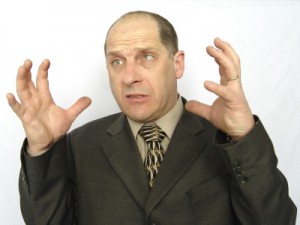
info@guilamuir.com
Think of a skill you have, (such as driving, swimming, writing, reading…) Would you say you are unconsciously competent with this skill? That is,
- Can you do it without thinking about it?
- Is it part of you, like an instinct?
- Would you have a hard time explaining the steps of this skill to someone with no knowledge at all about it?
All of us have skills like these. And it’s great that we do! And yet, here’s the big question. Can this level of expertise actually hurt us as teachers, trainers or presenters?
Before taking a guess at the answer, consider this experiment Elizabeth Newton did in 1990 at Stanford University. She assigned volunteers to one of two roles, either a “tapper” or a “listener.” Each tapper was asked to pick a well-known tune such as “Happy Birthday” and tap out the rhythm on a table. The listener’s job was to guess the song.
Over the course of the experiment, 120 songs were tapped out. Listeners guessed only three of the songs correctly, making the success ratio only 2.5 percent. But before they guessed, Newton asked the tappers to predict the probability that the listeners would guess correctly. They predicted 50 percent. The tapers were flabbergasted by how hard the listeners had to work to “get” the tune.
Why?
The problem is that once we know something (for example, a song’s melody or a skill), we find it hard to imagine not knowing it. Our knowledge has cursed us. The more intimately we know a subject or a skill, the harder it may be to effectively teach or present it to others in a way they can understand. We may find it impossible to fathom how to teach because we don’t know where to begin.
The Need for “Conscious Competence”
It’s common knowledge that experts who know the most about a topic don’t always make the best teachers. In fact, some of the very worst teachers have the highest levels of knowledge and expertise. These experts have lost touch with conscious competence, and they wonder why their students aren’t learning.
As presenters and trainers, we must come to our subjects anew. We need to get in touch with what the Buddhists call “beginner’s mind”, an experience of openness, eagerness, and lack of preconceptions. But we must also “crank ourselves down” from unconscious competence to conscious competence.
Conscious competence is the state we’re in when we are able to do a skill, yet must still concentrate on its steps and nuances. It’s the state we inhabit when we don’t feel like an expert, even if we are. Even if we must concentrate in order to do the skill correctly, we can verbalize each step we take. We are not on automatic pilot.
A Challenge
So-beyond the need to “know your stuff,” which elements do YOU believe are most important to make a great teacher? Here’s this month’s challenge. Please take the time to answer the question, What makes a great teacher, trainer, or presenter? in the “add new comment” box below. I’ll publish the most-often stated ideas in our next newsletter.
Thanks to The Art of Explanation, by Lee Lefever, for introducing me to the Stanford experiment.
Learn about Guila Muir’s Presentation Skills Workshops.
Guila Muir is a premiere trainer of trainers, facilitators, and presenters. Since 1994, she has helped thousands of professionals improve their training, facilitation, and presentation skills. Find out how she can help transform you from a boring expert to a great presenter: www.guilamuir.com


Best teachers provide the art of discovery: where the student or listener can have an “aha” moment when they learn/get a concept. If you spoon feed information to people, they tune you out.
The best presenters KNOW what their audience knows and doesn't know.
A great teacher presents information in a way that connects the topic to the specific audience in way that is meaningful and memorable to them.
What great comments! Keep 'em coming…
At Language at Work we believe that good teachers need the organizational skills to structure lessons in ways that lead to discovery, and the art of making information meaningful to the learner.
Judy Pollock, Language at Work